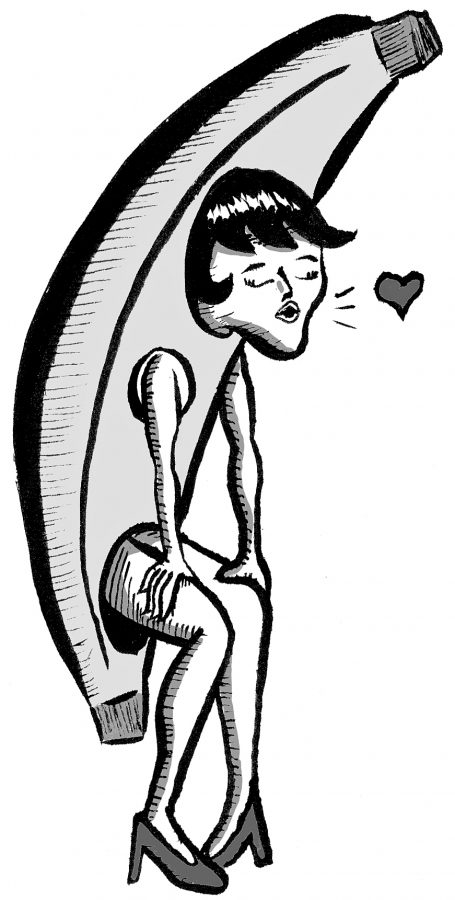Virtually every female college student can recognize this line from the movie “Mean Girls,” spoken by Amanda Seyfried’s character as she exasperatedly points to the mouse ears that, together with skimpy lingerie, constitute her Halloween costume. Young women have recreated that outfit on countless Halloweens since then, along with a variety of sexualized costume versions of nurses, French maids and even Big Bird (yes, as in the character from “Sesame Street”). Though squeezing into a revealing costume seems like a commonplace, trivial matter, it reflects a larger issue that speaks volumes about the sexual climate on our campus and campuses across the country.
Before continuing, I want to make a distinction between “sexy” and “sexualized.” Sexiness refers to a subjective judgment of attractiveness, and revealing ensembles aren’t necessarily “sexy.” But sexualized costumes, according to journalism professor Robert Jensen, “present women as objectified bodies for the pleasure of men. This idea extends across the [board], not just with Halloween costumes.”
Sexualization, then, is about something being sexual in nature, and near-nudity definitely qualifies as sexualized in our culture.
Moreover, confusing these sexualized Halloween costumes with “sexy” Halloween costumes narrows our conception of beauty, Jensen says.
“To call [revealing costumes] sexy buys into the idea that [they make] women look beautiful.”
It’s obvious that when female students choose to wear a low-cut, short-hemmed, sexualized ensemble, the intention is to be sexy. Thus, equating “sexy” and “sexualized” means restricting beauty and attractiveness to the physical form. This prompts the question: Why do we, as young women, limit our own conception of beauty?
One answer? The extensive influence of media. The source of it is everywhere: the Internet, TV or tabloid stands in the checkout line. “The costumes tell you something about the increasingly pornographic nature of contemporary culture,” Jensen said.
Certainly, sex sells. Madonna embodied this in the ‘80s, and Miley Cyrus is attempting the same today. The problem with this commonplace hypersexuality is that we still live in a deeply patriarchal culture. “That is the fundamental question,” Jensen said. “How do you resist the patriarchal culture?”
That is a much larger problem that I believe can only truly be addressed through education. But one temporary and theoretical solution could be that students boycott all social gatherings where women are expected to dress revealingly and men may act predatorily. You’re probably scoffing right now and thinking, “That will never happen at UT.” And you’re correct about that — at least for now — because there is currently no compelling feminist movement on campus shaping student ideology. But there are still conscious individual choices young female students can make this Halloween.
Simply choose a costume based on your personality and taste. Halloween isn’t about sexuality or modesty, anyway — don a costume that shows off your intelligence, humor and cleverness. Don’t buy into the media’s glorification of hypersexuality. Or, you can just go ahead and sport that Spandex/choker/garter thing you had planned with your friends, and do so proudly. Wear what makes you happy, and know that you don’t deserve any kind of punishment for that.
Last Halloween, I chose to don an elaborate Mulan costume with long sleeves, a sweeping hem and a full face of eerie white makeup and exaggerated black eyes. My reasoning wasn’t necessarily to cover up and avoid being objectified; it was simply what a Mulan costume entailed, and it plain old fun to dress up as a favorite childhood character.
At the same time, however, I’d be lying to say I wasn’t conscious of the implications my costume choice might have. I’m aware of those implications whether it’s Oct. 31 or any other day of the year. As a young woman navigating the waters of an often overtly patriarchal culture, I personally feel unsafe walking through West Campus alone at night, leaving a drink unattended and, yes, wearing notably revealing clothing in party settings. These are just the bounds of my individual comfort zone, but the takeaway is to critically identify your own boundaries and to respect them, even if it is just a Halloween costume.
Ultimately, the choice is yours. Base your decision on what makes you comfortable, what message you’re OK with sending and what allows you to explore yourself and form positive relationships. The key in all three choices is awareness. To blindly throw on mouse ears over lingerie would be to conform to unhealthy ideas about identity and sexuality, and that’s a costume you can’t just take off.
Huynh is a Plan II and business honors sophomore from Laredo. Follow Huynh on Twitter @raychillinn.





















